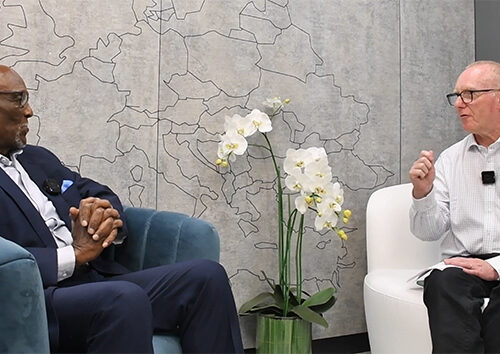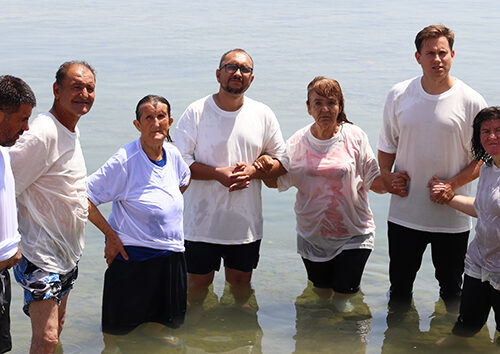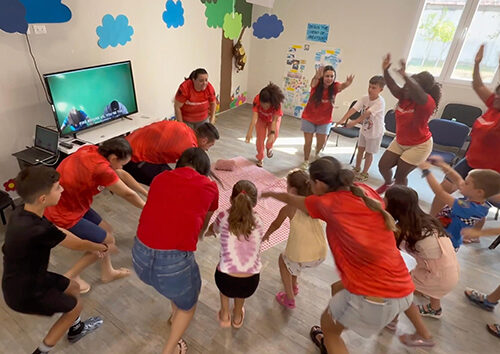13 July 2020 | Watford, UK [Jacques Venter]
Jacques Venter is a white South African who grew up during the apartheid era. He confesses that he has had much to learn as well as to unlearn, both from his time in South Africa, and since then as a pastor working in the United Kingdom. Pastor Venter currently serves as British Union Conference Associate Executive Secretary. This article is based on a BUC morning worship that he shared via live-stream on Friday, 10 July, 2020.
The Need to Belong
My wife and I have two daughters – Layken (15) and Jaymee (11). Our favourite picture of the two of them was taken inside Zizzy’s Restaurant near the Tower of London some six years ago.
But I have a second picture that is significant. It is Jaymee and me – just one year ago. The picture was taken shortly after we began the process to get Jaymee assessed for Asperger’s Syndrome. This started us on a difficult journey.

One of our friends told us to get her the book, I Am An Aspie Girl,1 by Danuta Bulhak-Paterson. It tells the story of Lizzie who has Asperger’s. It explains how she feels after a full day at school. How worried she gets when she makes mistakes. How it hurts her when school friends and family misunderstand her and make fun of her view of things.
 So, one evening my wife sat with Jaymee as they read the book together. As they finished reading Jaymee suddenly burst into tears. After calming her down she eventually shared that she was crying because all the things Lizzie explains in the book is what she experiences almost every day.
So, one evening my wife sat with Jaymee as they read the book together. As they finished reading Jaymee suddenly burst into tears. After calming her down she eventually shared that she was crying because all the things Lizzie explains in the book is what she experiences almost every day.
I share this with you because the most important point the book is trying to make to parents or significant other adults in such a child’s life, is how important it is for children to feel like they belong.
Belonging is a fundamental human need. Feeling part of something, believing you are a piece of a greater whole, brings satisfaction and security. Belonging can give you a sense of purpose, and the experience of solidarity when belonging to a group creates a meaningful community of relationships.
Working alongside people who might be serving an important cause, or being on a championship team, or aligning with others who are working to change things makes a person feel important and useful. Belonging and identifying with your group members, whether it be political, cultural, religious or social can be one of the most fulfilling aspects in life.
Belonging and toxicity
However, there is a potentially negative side to belonging. Solidarity itself can become toxic.
Solidarity in its beauty can help us experience shared identity as we bond over similarities. Yet solidarity when left unchecked can and often does turn toxic by creating an “us versus them” ideology. It can create a situation where you view someone who is not of your team, or your group as the enemy.
There is no human sense of belonging that is not free from the possibility of degenerating into such self-centred solidarity. We need to recognise the “us versus them” inside ourselves. There is no group or culture in which we can belong that, in this fallen world, is not susceptible to creating a sense of self-centred belonging at the expense of others – in other words a belonging by excluding.
Belonging and the Kingdom of God
Please don’t misunderstand me! I’m not advocating self-imposed solitude for fear of group prejudice. That is not a healthy alternative. Connection and human relationship is core to God’s creativity and His image in which we have been created. I’m simply trying to say that the only group where belonging without excluding others is possible, is in the Kingdom of God.
This is the very kingdom Jesus inaugurated at his birth and the very principles of inclusion, equity and justice that led to his crucifixion. And although that future eternal kingdom of God, in which just and diverse inclusive belonging will fully exist, is still to come, Jesus inaugurated it and provides us with the righteous example of how we ought to live, as much as possible making that a reality in the here and now.
Belonging, in all its beauty, is part of the reason why the transforming message of God’s love through the life, death and resurrection of Jesus, multiplied so rapidly in the early centuries of Christianity.
But there is also an ugly side to belonging. If left unchecked, it brings about toxic and inhuman ideologies. We see this clearly throughout the Bible. A particular miraculous experience in the ministry of Jesus reveals the ugly side of a belonging that separates.
Read the story of the man born blind in John 9:8-34 – and think what it means in terms of belonging:
His neighbours and those who had formerly seen him begging asked, “Isn’t this the same man who used to sit and beg?” Some claimed that he was. Others said, “No, he only looks like him.” But he himself insisted, “I am the man.” “How then were your eyes opened?” they asked. He replied, “The man they call Jesus made some mud and put it on my eyes. He told me to go to Siloam and wash. So I went and washed, and then I could see.”
“Where is this man?” they asked him. “I don’t know,” he said. They brought to the Pharisees the man who had been blind. Now the day on which Jesus had made the mud and opened the man’s eyes was a Sabbath. Therefore the Pharisees also asked him how he had received his sight. “He put mud on my eyes,” the man replied, “and I washed, and now I see.” Some of the Pharisees said, “This man is not from God, for he does not keep the Sabbath.” But others asked, “How can a sinner perform such signs?” So they were divided. Then they turned again to the blind man, “What have you to say about him? It was your eyes he opened.” The man replied, “He is a prophet.”
They still did not believe that he had been blind and had received his sight until they sent for the man’s parents. “Is this your son?” they asked. “Is this the one you say was born blind? How is it that now he can see?” “We know he is our son,” the parents answered, “and we know he was born blind. But how he can see now, or who opened his eyes, we don’t know. Ask him. He is of age; he will speak for himself.” His parents said this because they were afraid of the Jewish leaders, who already had decided that anyone who acknowledged that Jesus was the Messiah would be put out of the synagogue. That was why his parents said, “He is of age; ask him.”
A second time they summoned the man who had been blind. “Give glory to God by telling the truth,” they said. “We know this man is a sinner.” He replied, “Whether he is a sinner or not, I don’t know. One thing I do know. I was blind but now I see!” Then they asked him, “What did he do to you? How did he open your eyes?” He answered, “I have told you already and you did not listen. Why do you want to hear it again? Do you want to become his disciples too?” Then they hurled insults at him and said, “You are this fellow’s disciple! We are disciples of Moses! We know that God spoke to Moses, but as for this fellow, we don’t even know where he comes from.” The man answered, “Now that is remarkable! You don’t know where he comes from, yet he opened my eyes. We know that God does not listen to sinners. He listens to the godly person who does his will. Nobody has ever heard of opening the eyes of a man born blind. If this man were not from God, he could do nothing.” To this they replied, “You were steeped in sin at birth; how dare you lecture us!” And they threw him out. [John 9:8-34 NKJV]
There is much in this passage that I wish we had time to consider, but pause for a moment at John’s comment in verse 22 and 23: “His parents said this because they were afraid of the Jewish leaders, who already had decided that anyone who acknowledged that Jesus was the Messiah would be put out of the synagogue. That was why his parents said, ‘He is of age; ask him.’”
Why did John feel it necessary for us to know why the parents did this? It seems that he felt is essential for his readers to know that instead of affirming their child’s miraculous experience and exploring with him the prevailing worldview and religious-cultural norms that Jesus was upending, they decided to acquiesce, thereby allowing the prevailing dominant group’s religious-cultural solidarity to go unchallenged.
John reveals the folly of the power of this feeling of self-centred solidarity in the very real consequences the parents believe that they will experience in breaking with the religious-cultural solidarity of the Jewish leaders. And it is the fear of this very real consequence, of the threat of censure, the threat of being excluded from the group that causes the parents to acquiesce and maintain the unjust status quo.
John reveals the folly of the power of self-centred solidarity by the juxta positioning the parent’s ignorant and cowardly thinking with the repetitive questioning of the blind man that reveals the victorious nature of God’s Kingdom. The blind man can now see more clearly than those who could see before him.
Power and belonging today
I believe that this miracle story is symbolic of what is playing itself out on a macro level right now in human history.
Christine E. Sleeter in her book, Multicultural Education as Social Activism, refers to the experience of solidarity among white people, as a race, as social bonding. She says that when we as white people interact, we affirm, “a common stance on race-related issues, legitimating particular interpretations of groups of colour, and drawing conspiratorial we-they boundaries.”2
Picking up on Sleeter’s observation, Robin DiAngelo shares from her own experience and years of research, in her book White Fragility (p. 57-58), that “White solidarity requires both silence about anything that exposes the advantages of the white position and tacit agreement to remain racially united in the protection of white supremacy. To break white solidarity is to break rank.”3
My journey
I have experienced and lived this. During my school years in South Africa racially offensive and derogatory comments and actions as well as racist jokes were common. I have shamefully been on the side that shared these and repeated them for a laugh during my own childhood and even during my adult life. It also horrifies me to affirm that I still experience it today and shamefully I know that I have participated in this kind solidarity. I’ve also found myself, like the parents of the blind man, staying quiet and dismissing the severity of the sin, because I did not want be seen as a spoilsport, but even more pressing I did this because I was afraid of jeopardising my right to be in the group.
That’s white solidarity! Such self-centred, racially or religious superior solidarity at the expense or exclusion of others went against the principles of God’s Kingdom in Jesus’ time and it is still wrong in our time. This is the very sin at the heart of God’s commandment, “You shall not give false testimony against your neighbour.”
The sin this commandment addresses is the very act or the absence of the act that causes me to exalt myself at my neighbours’ expense, that delegitimises my neighbours’ value in order to make me feel better.
The witness I bear, the testimony I give that causes me to exalt my gender at the expense of women, that exalts my group at the exclusion of another, that makes fun of ‘the different’, that is false testimony. The very real consequence of maintaining white solidarity and thus endorsing white racial supremacy is committing the sin of false testimony.
I recognise that in my own life I have all too often, in an effort to avoid conflict and wanting to be liked, chosen to remain silent. Equally, my daughter, Jaymee, has in her short 11 years of life on several occasions been left stranded by friends who would stop playing with her and stay silent when the mocking starts, for fear of losing access to the ‘in group’.
But here’s the problem. When I, like the parents of the man born blind in John 9, kept quiet in the face of injustice and racism, I was rewarded with social capital. I learned what all the white children today learn by the time they leave primary school, and that is that we are rewarded for not interrupting racial injustice and racism and we are punished by the group, in a range of ways, when we do.
In John 9 the parents justified themselves by relationally disconnecting themselves from their child, even in the face of blatant religious bigotry. In a similar way, my silence as a white person in today’s world is not benign, because it protects and maintains the racial hierarchy and my place within it and perpetuates the sin of racism.
Robin Diangelo writes, “People of colour certainly experience white solidarity as a form of racism, wherein we fail to hold each other accountable, to challenge racism when we see it, or to support people of colour in the struggle for racial justice.”4
There is a positive way forward
This past Monday our daughter Jaymee’s teacher sent us the following email:
I hope you’re all well…Jaymee wanted to tell the class today about ASD and about a book she had read that explains her experiences. She explained it all so clearly and I was really impressed and proud of her, it was a very brave thing to do.
She explained things so clearly and it was really enlightening and valuable to the children. They reacted very positively, lots of nods and smiles to show support. They clapped her afterwards as they knew it wasn’t easy to get up and explain. She explained to them how she sometimes might react to things in a different way and how she thought it was good for them to know. We spoke afterwards about how everyone’s different and the children agreed that this is what makes humans so special, that none of us are the same.
 It breaks my heart to know that this will not be the last time Jaymee will have to speak up for herself. On this occasion it took place in a safe and caring environment. We know as parents that secondary school and society at large will not always be that kind to her. However, I am proud of my daughter.
It breaks my heart to know that this will not be the last time Jaymee will have to speak up for herself. On this occasion it took place in a safe and caring environment. We know as parents that secondary school and society at large will not always be that kind to her. However, I am proud of my daughter.
I am also grateful and proud of black and other ethnic minority friends who are speaking up in a Christlike manner at this juncture in human history. However, it is not right that we place this burden on them. It’s time for me to disrupt the silent playground of systemic racism and injustice with God’s megaphone of love. And if you have the same skin colour as me – I would invite you to join me in that challenge!
Jesus’ very act of healing the blind man without the blind man asking, and Jesus’ very act of dying on the cross for you and me, without us having asked him to do so, is a call for us to take up our cross in the same way and proactively seek to upend systemic racism.
To upend injustice because God’s love cannot and will not acquiesce in the face of injustice and inequality. I want to challenge you today to help me to show the world what God’s love really looks like.
#LoveNotHate.
tedNEWS Staff: Victor Hulbert, editor; Deana Stojković, associate editor
119 St Peter’s Street, St Albans, Herts, AL1 3EY, England
E-mail: [email protected]
Website: www.ted.adventist.org
tedNEWS is an information bulletin issued by the communication department of the Seventh-day Adventist Church in the Trans-European Division. Readers are free to republish or share this article with appropriate credit including an active hyperlink to the original article.




